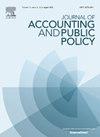中期重述与审计业务
IF 2.2
3区 管理学
Q1 BUSINESS, FINANCE
引用次数: 0
摘要
我们研究了10-Q错报的审计含义,并探讨了发现和纠正这些错报的时间如何影响审计。我们发现,审计人员对中期重述的反应是收取更高的费用,花更多的时间来完成审计,并发布更多的icmw。尽管有这些变化,中期重述与年终财务报告质量负相关。德勤进一步区分早期中期重述和晚期中期重述,并发现一些支持证据表明晚期中期重述对审计业务的影响更大,这与较晚发现错报使客户和审计师适应较高的审计业务风险的灵活性降低的概念相一致。总体而言,德勤提供了有关中期重述(特别是此类重述的时间安排)如何对审计业务产生不同影响的证据。本文章由计算机程序翻译,如有差异,请以英文原文为准。
Interim restatements and the audit engagement
We examine the audit implications of 10-Q misstatements and explore how the timing of the detection and correction of these misstatements affects an audit. We find that auditors respond to interim restatements by charging higher fees, taking more time to complete an audit, and issuing more ICMWs. Despite these changes, interim restatements are negatively associated with year-end financial reporting quality. We further distinguish between early and late interim restatements and find some supporting evidence that late interim restatements have greater impacts on audit engagements, consistent with the notion that late detection of misstatements allows less flexibility for the client and auditor to adjust to heightened engagement risk. Overall, we provide evidence on how interim restatements in general, and the timing of such restatements in particular, have different implications for audit engagements.
求助全文
通过发布文献求助,成功后即可免费获取论文全文。
去求助
来源期刊

Journal of Accounting and Public Policy
Multiple-
CiteScore
4.80
自引率
2.80%
发文量
75
期刊介绍:
The Journal of Accounting and Public Policy publishes research papers focusing on the intersection between accounting and public policy. Preference is given to papers illuminating through theoretical or empirical analysis, the effects of accounting on public policy and vice-versa. Subjects treated in this journal include the interface of accounting with economics, political science, sociology, or law. The Journal includes a section entitled Accounting Letters. This section publishes short research articles that should not exceed approximately 3,000 words. The objective of this section is to facilitate the rapid dissemination of important accounting research. Accordingly, articles submitted to this section will be reviewed within fours weeks of receipt, revisions will be limited to one, and publication will occur within four months of acceptance.
 求助内容:
求助内容: 应助结果提醒方式:
应助结果提醒方式:


